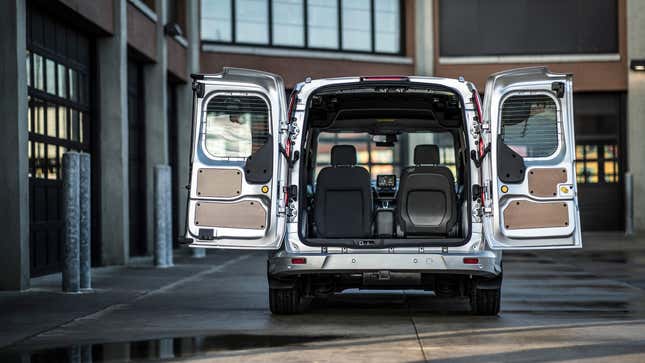
Back in the 1940s the U.S. government implemented a cash prize for chicken breeders who could produce bigger birds in less time. Here in 2021, the domino effect has had its way with the world as Ford is potentially facing a 1.3 billion dollar fine for importing Transit Connect vans to from Turkey. Those two sentences are related, I promise.
Before we make that connection a little more obvious, here’s the situation. According to Reuters, the Detroit automaker is facing a charge from the U.S. Customs and Border Protection of unpaid duties totaling $181 million, and an additional monetary penalty “as much as $652 million to $1.3 billion.” The case has been wound up in the courts for a few years now, though it seems to now be settled as the Supreme Court declined to hear Ford’s appeal last year.
Ford imported Transit Connects as passenger wagons, and had a separate finishing facility here stateside which allowed the company to remove the rear seats and strip them down for conversion into cargo vans. This was done because cargo vans are hit with a 25 percent tariff, while passenger vehicles are only levied a 2.5 percent tariff. All cargo vans and pickups are hit with this massive tax, which dates back to 1963.
The government claims that Ford intentionally misled customs and customers alike by fitting these Transit Connect vehicles with cheap rear seats intended solely to be thrown in the trash. Ford rebuffs the claims by stating that every seat in the vehicle was equipped with all of the safety standard equipment required to be street legal, and qualified as passenger vehicles when the cars passed customs inspection.
The Chicken Boom
Okay, so now we know what Ford is facing, let’s take a deeper look at why. I’m not going to go quite as far back as the dawn of the chicken industry in the U.S. and its direct connection to antebellum slavery, but I will, however, start with the second world war. You see, during WWII, the government placed restrictions on how much beef and pork American families could buy in time of war, as the food supply was needed to feed the war effort. Chicken was cheap and plentiful, so it began supplanting other meats in the American diet.
After the war demand waned as Americans were then cleared to buy beef and pork again. In an effort to keep the chicken industry alive, the Government put up a challenge to growers; Create the super chicken of the future to boost growing efficiencies. The aim was to breed a bird that would not only grow to size in less time, but have more meat on the bone. There was a $5,000 cash prize for the nation’s most plump and efficient-growing birds. Obviously they nailed it, and suddenly the U.S. was a gross exporter of frozen poultry.
In an effort to save their own domestic chicken production industry, France initially instituted a massive tariff on imported chicken to keep prices high and farms profitable. West Germany and other European Economic Community members Luxembourg, Belgium, the Netherlands, and Italy, followed after. Accusations were made that American chicken producers were dumping chicken in Europe below cost to drive domestic production out of business, American chicken hormones were damaging to the men of France, and that these birds were being fed unsafe levels of arsenic to promote muscle growth. The resulting loss of European sales cost the American poultry industry an estimated 28 million dollars by 1962, which is what we call in the business a whole lot.
After several months of attempts at finding a diplomatic solution to what was then known as the chicken war, nobody would meet in the middle and the American chicken industry was hurting without its steady exports. In retaliation for the EEC’s tariff, President Lyndon B Johnson pushed through a tax on goods imported from Europe in December of 1963. The initial idea was a heavy 25 percent tariff on things like potato starch, the chemical Dextrin, and after-dinner digestif brandy. This alone would have been significant, but a fateful meeting with the president of the United Auto Workers union would have long-lasting consequences. Here’s where we start talking about cars again!
Volkswagen Van and the UAW Strike
The many different flavors of Volkswagen’s iconic van had become highly sought after throughout the early 1960s. These vans were reliable, inexpensive, and fuel efficient. The Type 2 van was offered in a variety of commercial van and pickup configurations, offering an excellent alternative to the big American pickup trucks and full-sized vans of the day. As a result, these vans and trucks were selling like hot cakes, cribbing sales from Ford, Dodge, and Chevrolet.
President Johnson was facing reelection in 1964 and desperately wanted to avoid a UAW strike to keep the economy from falling under his tenure. In a meeting with UAW president Walter Reuther, Johnson proposed a quid pro quo. If Reuther would prevent his union from striking, the president would include light truck imports in his retaliatory tariff on Europe, effectively killing the Volkswagen van’s sales bonanza. The deal was struck, truck imports were taxed 25 percent, and LBJ got his re-election.
What is the Chicken Tax?
President Johnson’s tariff came to be known as the chicken tax. It forced importers, like Volkswagen, to pay a 25 percent import tax to the U.S. government for every light truck or commercial van it brought into the country. That tax increased the price of the van, and it was no longer competitively priced with American-made options. Because this applied to all imported trucks and vans, the Japanese automakers were equally hit by this, despite not having qualms with the U.S. chicken industry.
1964 light truck and commercial van imports tanked to about a third of what it had been in 63, and by 65 the import brands were practically gone from the American market altogether. Without the stiff competition of the smaller, lighter, easier-to-drive, and more fuel efficient import pickups and vans, Detroit automakers were no longer required to keep pace with innovation of foreign brands. While this did protect the big three automakers in the short term, the increased competition might have forced them to develop trucks and vans more in line with what American car buyers had proven they wanted in the early 1960s.
It’s somewhat ironic that Ford, one of the manufacturers the chicken tax was intended to support, has potentially fallen into its grips. The Transit Connect was a great van, but it’s possible that this massive fine will negate Ford’s entire profit strategy for this vehicle, and prevent the company from attempting to import any of its small vans or trucks in the future. I suppose that’s the point of the fine.
